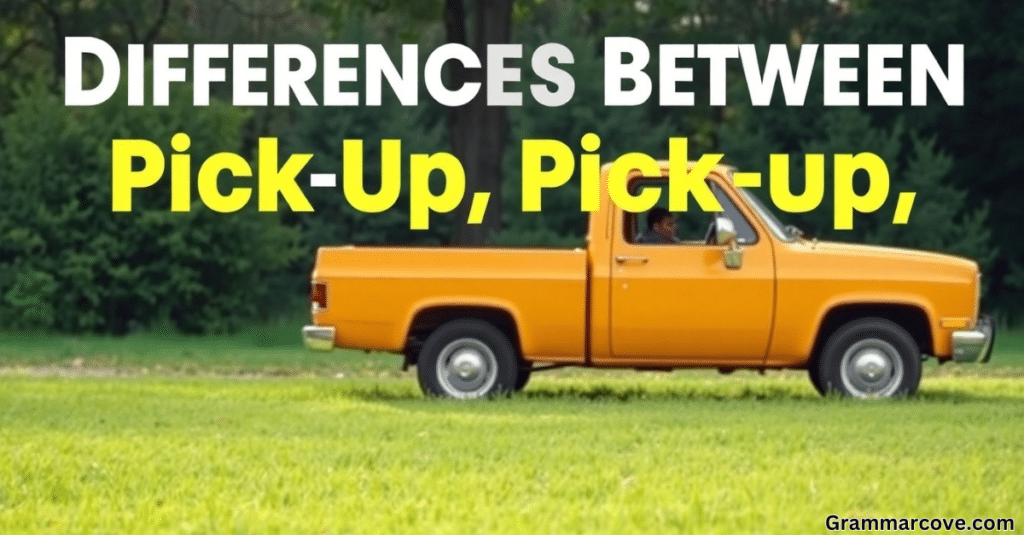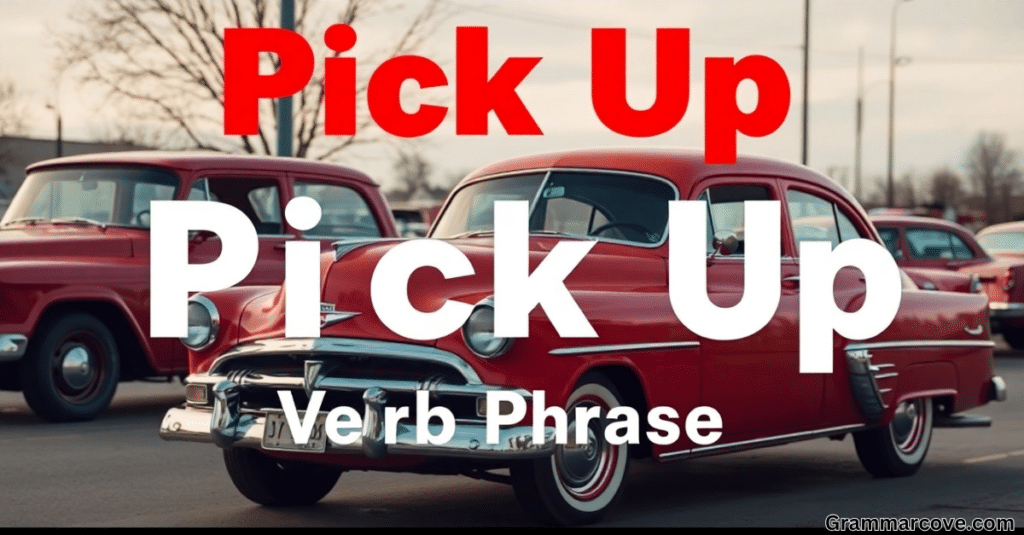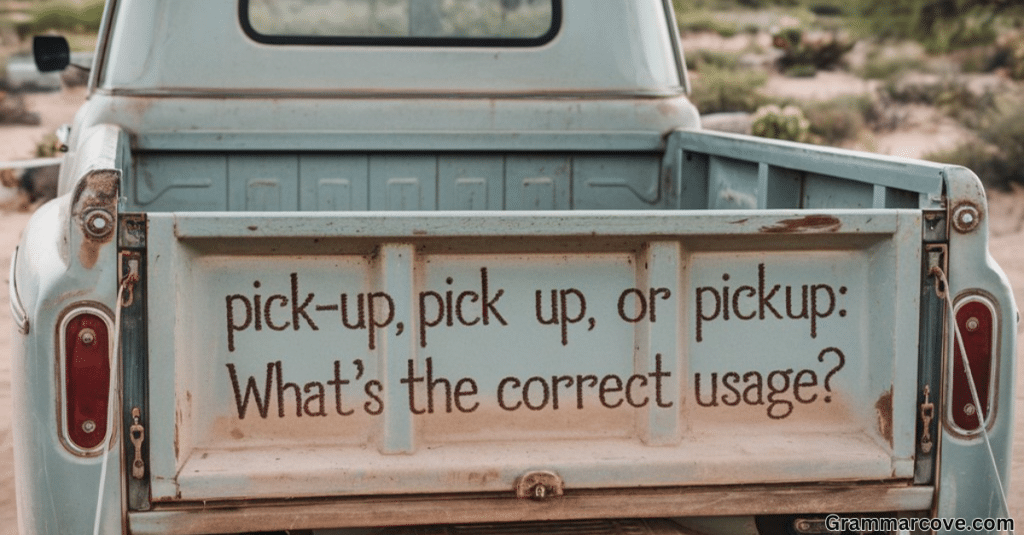The English language has many small but important differences in word usage. One common example is Pick-Up, Pick Up, and Pickup—three similar-looking terms that each serve a unique purpose. Understanding the correct usage of Pick Up, Pickup, and Pick-Up can help you communicate more clearly.
This guide will break down each one, explaining when and how to use them with examples.
Differences Between Pick Up, Pickup, and Pick-Up

Though these words look and sound alike, their meanings depend on how they’re used in a sentence. Here’s a breakdown:
- Pick Up – A verb phrase that describes an action, such as retrieving or collecting.
- Pickup – A noun, referring to an event or item to be collected (like a scheduled pickup) or a type of vehicle (pickup truck).
- Pick-Up – An adjective, usually used to describe a specific area or point related to picking up.
Pick Up: The Verb Phrase
When Pick Up appears as two words, it’s a verb phrase that describes the action of retrieving or collecting. This form is common in everyday English.
Examples of “Pick Up” in Sentences
- Errand Example: “I need to pick up some groceries after work.”
- In an Email:Subject: Request to Pick Up Documents
Hi Emma,
Could you please pick up the signed documents from our main office tomorrow morning?
Thanks,
John
In these examples, Pick Up means someone is being asked to collect or retrieve something.
Pickup: The Noun Form
Pickup as one word is a noun. It refers to an event (like a scheduled pickup), an item collected, or even a pickup truck. pick-up-pick-up-or-pickup-the-correct-usage.
Examples of “Pickup” in Sentences
- Scheduled Event: “Your package is ready for pickup at 3 p.m.”
- Vehicle Reference: “Jason just bought a new pickup truck for his construction business.”
- In a Reminder Email:Subject: Pickup Reminder
Hi Amanda,
Your scheduled pickup is set for 3 p.m. on Thursday. Please let us know if you need to reschedule.
Best,
Customer Service Team
When used as a noun, Pickup can describe both an event for collecting something or a type of truck.
Pick-Up: The Adjective Form
Pick-Up with a hyphen acts as an adjective, describing things related to picking up items or people.
Examples of “Pick-Up” as an Adjective
- Transport Schedule: “There will be a designated pick-up point near the entrance.”
- In a Planning Email:Subject: Confirming Pick-Up Location
Dear Mr. Adams,
Your pick-up location has been set at the South entrance of the event venue.
Regards,
Travel Coordinator
The hyphenated form Pick-Up makes it clear that you’re describing a location or point meant for pickups.
Using “Pick Up” as a Verb Phrase

Whenever you’re describing an action, Pick Up works best as a verb phrase. For example:
- Work Directive: “Please pick up the reports from the office after the meeting.”
- Parenting Context: “Sarah has soccer practice. Can you pick her up at 5 p.m.?”
Using “Pickup” as a Noun
Use Pickup as a noun when you’re talking about a specific event, like a scheduled pickup or a pickup truck.
- Customer Service Notice: “We arranged a pickup for your package on Friday.”
- Vehicle Purchase: “Mike just bought a new pickup truck.”
Using “Pick-Up” as an Adjective
When Pick-Up is used with a hyphen, it serves as an adjective describing something related to a pickup area, zone, or point.
- In a Schedule: “The company has a designated pick-up zone.”
Understanding Pickup Truck Meaning
A pickup truck refers to a vehicle with an open cargo area for transporting goods. This usage doesn’t refer to any act of picking up—it’s simply the vehicle type.
- Example: “James bought a new pickup truck for his landscaping business.”
Synonyms for Pickup and Pick Up
You can replace Pickup and Pick Up with other words depending on the form:
- Pick Up (Verb): Collect, Retrieve, Gather, Fetch.
- Pickup (Noun): Retrieval, Collection.
- Pick-Up (Adjective): Collection (as in “collection point”).
Key Takeaways

Using Pick-Up, Pick Up, and Pickup correctly can make your English more precise and clear:
- Pick Up (verb): Use for actions of collecting or retrieving.
- Pickup (noun): Use for an event, pickup truck, or scheduled collection.
- Pick-Up (adjective): Use in more formal settings for pickup locations or areas.
Knowing when to use each form adds clarity to your communication, whether you’re writing emails, texts, or scheduling pickups.
Conclusion
Mastering the differences between Pick-Up, Pick Up, and Pickup can significantly improve your English communication, especially in professional and everyday contexts. Each term has a specific function:
- Pick Up is a verb phrase, used to describe an action, such as collecting or retrieving something.
- Pickup is a noun, referring to an event, collection, or a type of vehicle, like a pickup truck.
- Pick-Up functions as an adjective, often designating specific zones or points associated with pickup activities.
Understanding these distinctions helps you avoid common mistakes and enhances clarity in your writing, emails, or conversations. By choosing the correct form based on context, you’ll communicate more precisely, leaving no room for misinterpretation.
Remember, the English language nuances can sometimes be tricky, but with practice and attention to detail, you can confidently use Pick Up, Pickup, and Pick-Up accurately, whether you’re drafting an email, writing a report, or planning a pickup schedule.


